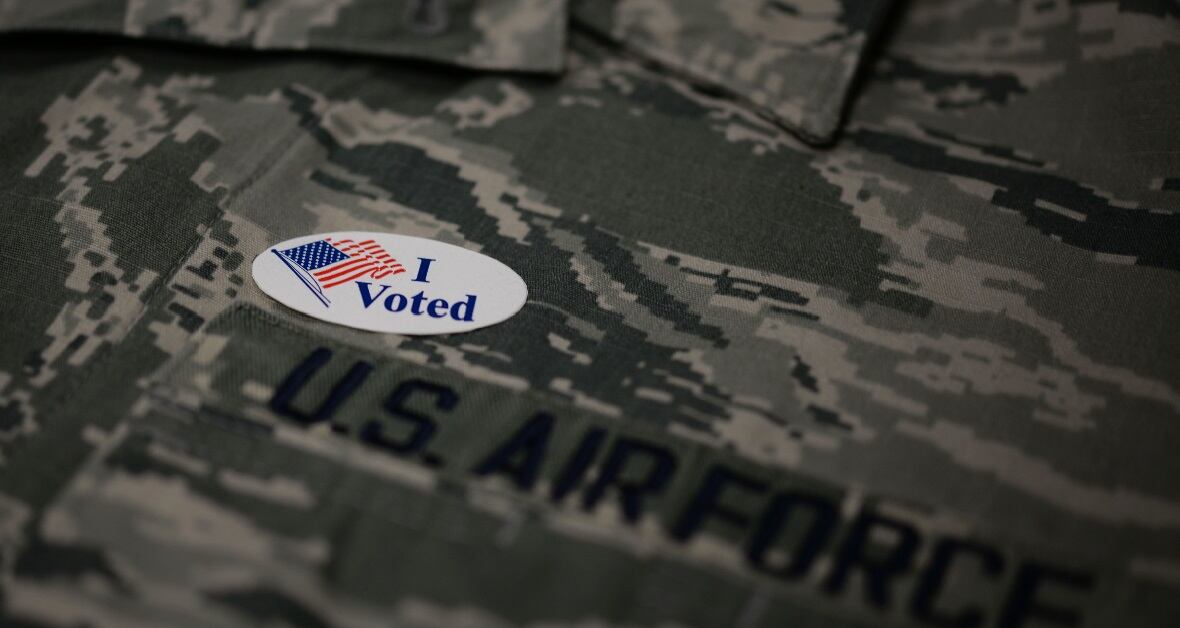This article was updated to include information that spouses and some others overseas can use free priority mail to send their absentee ballots.
If you’re among those voting by absentee ballot and you haven’t yet sent your ballot, it’s time to get serious.
This applies to military members, spouses and other dependents who are away from their voting district — whether elsewhere in the state, in the U.S., or overseas. It also applies to U.S. citizens living overseas.
If you have received your absentee ballot from your local election official, fill it out and send it back now, either electronically if your state allows it, or by mail.
Service members, spouses, voting-age dependents and civilians stationed overseas with military post office privileges can mail their absentee ballot for free by priority mail express, from overseas military postal locations, FPO or APO. A unique label for absentee ballots only — Label 11-DoD — when affixed to the absentee ballot envelope or flat, allows these voters to track their vote all the way to their local election office. The use of this label will continue through Dec. 8.
If you have requested a ballot and haven’t received it yet, or if you’re having trouble access your state website to download a ballot, go to FVAP.gov and use the Federal Write-In Absentee Ballot (FWAB). All states accept the FWAB as an official backup ballot for federal offices.
If you receive your state ballot after you submit your FWAB, you can still vote and return that ballot, too. States will only count one ballot.
Some voters overseas have had trouble accessing their state’s online voter registration and election systems, primarily because of states blocking web traffic from foreign countries, in their efforts to increase cybersecurity.
“FVAP continues to work with states to understand how to best address their cybersecurity concerns while maintaining voters’ rights. For military members, their families and other U.S. citizens overseas, that includes the right to receive their ballot electronically with sufficient time to submit it by ballot return deadlines,” David Beirne, director of the Federal Voting Assistance Program, said in a recent statement.
All the information you need is on that Federal Voting Assistance Program (FVAP) website, FVAP.gov. FVAP is run by the Defense Department, and its mission is simply to make sure service members and their family members and overseas citizens are aware of their right to vote and have the tools and resources to do so from anywhere in the world.
If you’re having trouble or have questions, you can also contact the FVAP call center toll free at 800-438-8683, or DSN 425-1584, Monday through Friday from 7:30 a.m. to 4 p.m. You can also email vote@fvap.gov. Local voting assistance officers in units and at installations can also help.
In some cases, you might still have time to request the ballot from your state and send it. You must first make sure you’re registered to vote in your district.
You can register to vote and request a ballot at the same time by using the Federal Post Card Application (FPCA), which can also be downloaded at FVAP.gov. Click on your state on the map, to find information, deadlines and links to the forms you can download, including the FPCA and the Federal Write-In Absentee Ballot (FWAB).
According to the National Conference of State Legislatures, as of Oct. 10, there are 37 states plus the District of Columbia that offer online registration. Deadlines for registration and ballot requests vary from state to state. But there are some states that will still allow you to register and request a ballot electronically before the election.
A few examples:
- North Carolina’s deadline to register to vote and request a ballot is Nov. 5. It allows you to return your ballot by email, online or by fax, if received by 7:30 p.m. Eastern on Nov. 6.
- Texas allows military, dependents and overseas voters who are not previously registered to submit an FPCA by the ballot request deadline (Oct. 26) to receive a ballot for federal offices. You can submit the FPCA by mail, email or fax.
- Virginia’s deadline for voter registration and ballot requests is 5 p.m. Oct. 30. You can submit the FPCA by mail, email or fax.
A recent survey of the Military Officers Association of America found that only 36 percent of active-duty military spouses vote in every election. One of the top reasons is that they don’t know how to get an absentee ballot.
“A common myth among spouses is that FVAP resources are only for the service member and that’s just not true,” said Meghan Kelly, spokeswoman for the DoD FVAP program. “Spouses and voting age dependents are able to use the Federal Postcard Application and Federal Write In Absentee Ballot.”
FVAP has specific information for spouses and eligible dependents here.
Karen has covered military families, quality of life and consumer issues for Military Times for more than 30 years, and is co-author of a chapter on media coverage of military families in the book "A Battle Plan for Supporting Military Families." She previously worked for newspapers in Guam, Norfolk, Jacksonville, Fla., and Athens, Ga.





